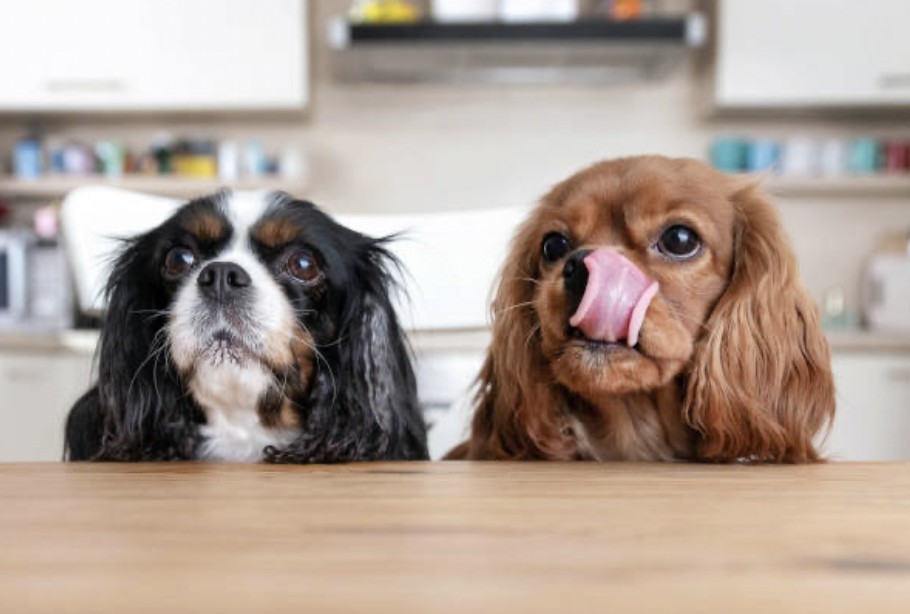5 Most Dangerous Foods for Dogs
If you consider yourself a dog person, you know the feeling of sitting at the dinner table as your pup gives you the irresistible wide-eyed gaze in hopes of getting their paws into their human’s tasty treats. Unfortunately, although there are human foods that are great for your canine, not all human foods should be consumed by your furry friend. Learn the top 5 human foods that are particularly dangerous for your dog before giving into their puppy-dog eyes.

1. Grapes
It isn’t known why grapes (and raisins) are so harmful to dogs. It is believed by some vets that the sugar in grapes is toxic to your dog’s kidneys. In short, they can’t break it down, and it causes kidney failure. This is more pronounced in smaller breeds, but big dogs can be effected as well. Obviously, the more the large dog eats, the more serious the problem.
Small dogs don’t need to eat many grapes for the situation to turn toxic.
If your pup has accidentally eaten grapes or raisins, call the emergency vet immediately and follow their directions.
2. Chocolate
Chocolate contains a substance called methylxanthine. This is part of the cacao plant. Humans digest it easily, but our canine friends cannot. Eating just a little chocolate can speed up your dog’s heart, and cause:
- Diarrhea
- Excessive thirst
- Abdominal cramping and pain
- Seizures
- Death
Dark chocolate is higher in cacao content, so it is even more dangerous to your dog.
If they’ve eaten chocolate, please call the emergency vet.
3. Prescription Drugs
While OTC medications are not food, they are often accidentally eaten by dogs. Pills accidentally fall to the floor. Your dog explores this world with his nose and mouth. It’s not uncommon for dogs of all breeds to pick up a pill (and just about anything that they deem interesting) with their mouths, chew, then swallow.
Depending on the medication, this can cause problems from severe stomach upset to death.
Small dogs are most at risk because of their lesser body weight. Most drug recommendations are based on the average, 120 – 175lb adult human. One pill may barely effect you, but it is a lethal overdoes to your 7-lb Pekinese.
Bigger dogs may only experience mild symptoms from small exposure to the OTC meds, but they also have stronger jaws, and while playing, can chew right through a full bottle, ingesting a lethal does of medication.
Some of the most dangerous OTC drugs for dogs include:
- NSAIDS (Aleve, Advil, etc.)
- Antidepressants (Cymbalta, Lexapro, Effexor, etc.)
- Benzos (Xanax, Klonopin, Lunesta, Ambien, etc. )
- Birth Control
- Some allergy medications
4. Alcohol
If you think alcohol negatively impacts your overall state of wellbeing, just imagine much it could affect your furry friends! Alcohol absorbs into animals’ skin in as little as 30 minutes. Letting your dog consume even the smallest amount of alcohol can result in a number of adverse conditions, such as lethargy, respiratory depression, dangerously low body temperature and even death.
5. Caffeine
Dogs are more sensitive to caffeine than humans are. A few laps of your morning brew likely won’t contain enough caffeine to poison your dog, however consuming too much can lead to health issues for your pet, such as high blood pressure or an elevated heart rate. Even decaffeinated coffee is dangerous due to the trace amounts of caffeine.
If you notice that your dog is sluggish, lethargic, or is vomiting, please get them to an emergency vet as soon as possible. Doggie ER’s are equipped to pump stomachs and give medication to purge the drugs from your dog’s symptoms.
Looking for weekly insights and tips to keep your best friend happy & healthy?
Look no further and sign up for our newsletter right away:



